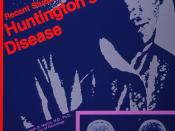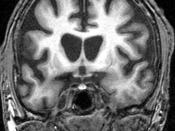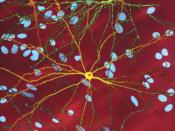Huntington's Disease
Huntington's disease, or Huntngton's chorea, is a genetic disease that causes selective neural cell death, which results in chorea, or irregular, jerking movements of the limbs caused by involuntary muscle contractions, and dementia. It can cause a lack of concentration and depression. It also may cause atrophy of the caudate nucleus, a part of the brain. However, symptoms vary between individuals, with some sufferers showing symptoms that others do not. Those suffering from Huntington's disease normally begin displaying symptoms between the ages of 30 and 50, but has been known to show itself in people as young as two and as old as 80.
Huntington's disease is inehrited from one of the victim's parents. Since the gene for HD is dominant, there is a 50% chance of a sufferer's offspring inheriting the disease. Because a victim usually does not begin to display symptoms until after the period in which he or she would have children and the disease may have been misdiagnosed in earlier generations as Parkinson's disease or other similar affliction, he or she might pass along the gene without even knowing it.
The gene for Huntington's disease is located on the short arm of chromosome four in cytogenetic band 4p16.3. It was first identified in 1993. While everyone posseses this gene, in someone suffering from Huntington's disease, the number of repeats of a certain trinucleotide, cytozine-adenine-guanine (CAG), is much larger than what it is in a normal person. In an average person, the number of repeats is between 9 and 37. But is a sufferer of HD, the repeat count is from 37 to 86. While nobody has found a direct correlation between the number of repeats and the age when symptoms appear, there is evidence that people with very high numbers of repeats...


